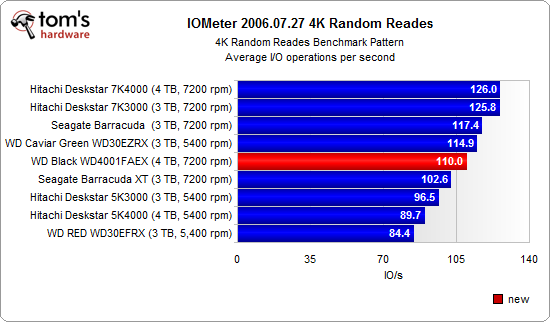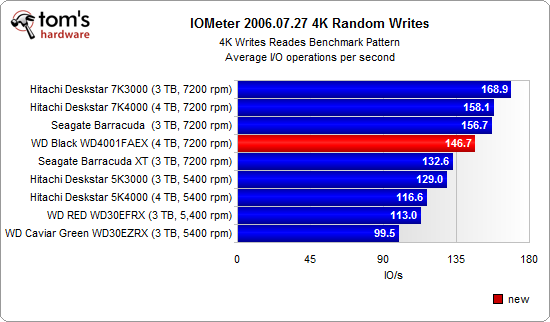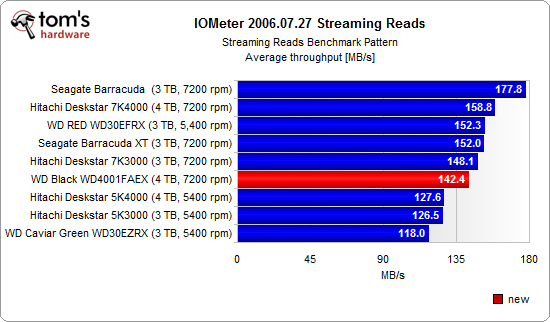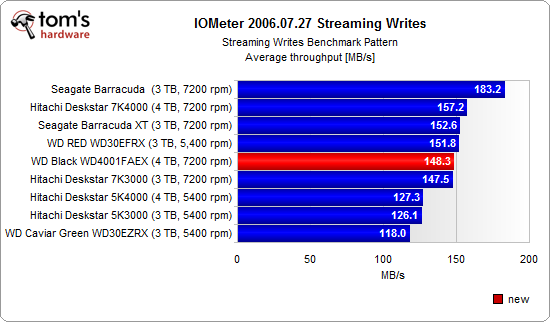Western Digital's 4 TB WD4001FAEX Review: Back In Black
Western Digital has a new 4 TB flagship. Its WD4001FAEX is part of the company’s Black family of performance-oriented drives. Spinning at 7,200 RPM, it might seem at home in a high-end desktop, but our numbers suggest it might fare better in a server.
Benchmark Results: 4 KB Random Reads/Writes And Streaming Reads/Writes
The random read/write performance of hard drives is usually dictated largely by spindle speed. However, our Iometer benchmarks demonstrate a handful of exceptions that blur the line between 7,200 and 5,400 RPM disks. The WD4001FAEX turns out to be one of the slower 7,200 RPM models. Only Seagate's Barracuda fares worse.
Of course, when you compare these results to those on the previous page, it's clear that Seagate is optimizing most heavily for sequential transfers. Western Digital does as well, to a less degree. The outcome is a compromise in random performance. We think that's a smart trade-off, considering conventional drives aren't well-suited to random I/O anyway, and it's probable that an enthusiast using a 7,200 RPM disk with 4 TB of capacity would probably also have an SSD under the hood handling more performance-sensitive duties.
The WD4001FAEX does moderately well in our streaming read and write tests. Its performance is neither really good nor really bad. Seagate's Barracuda leads our line-up by a significant margin, clearly outmaneuvering the competition.
Get Tom's Hardware's best news and in-depth reviews, straight to your inbox.
Current page: Benchmark Results: 4 KB Random Reads/Writes And Streaming Reads/Writes
Prev Page Benchmark Results: Data Throughput And Interface Bandwidth Next Page Benchmark Results: Seek Times And I/O Performance-
joytech22 ReplySo, who should buy Western Digital's WD4001FAEX? The company says its drive is meant for PC enthusiasts and professionals. But we can’t quite agree because Seagate's Barracuda is, quite simply, faster.
For enthusiasts, all we really want is space and lots of it. We fill it up fast, but we don't do anything super-intensive requiring a constant of 80+Mb/s over long durations.
For enthusiasts that do a lot of video editing using lots of tracks, sure it's a bit of a limitation but so is any one drive solution.
As for professionals, it just depends what they need it for.
A high-end workstation needing plenty of storage and speed just needs a RAID config containing a few of these babies. Or super-expensive high capacity SSD's...
All in all, I'm just saying it depends on your situation but generally you find people are happy with big drives regardless of speed (since all drives perform admirably nowdays anyway). -
mayankleoboy1 One thing i have never found a answer to : Is it worth defragmenting HDD's on modern systems, with Win7 and NTFS ?Reply
I do defragment my HDD, but subjectively i find no difference. And i have yet to find objective data. -
alidan mayankleoboy1One thing i have never found a answer to : Is it worth defragmenting HDD's on modern systems, with Win7 and NTFS ?I do defragment my HDD, but subjectively i find no difference. And i have yet to find objective data.Reply
it really depends.
if you dont have a boot specific drive, than defragmenting is kind of important.
if you do... than it doesn't tank system performance to not defrag.
really what kills a hdd performance is being a a boot drive and storage, as it can get so slammed with access that it drags the over all performance to sub mb levels.
what hurts a hdd on storage when its not a boot, is filling the damn thing up to the last mb.
generally, if you have a hdd and have enough space to defrag it without the program complaining (15-25% of the space remaining) you dont need to defrag. it helps, but you wont see the gains that you otherwise may see if you didnt have the space to defrag. -
avjguy2362 Before SSD's I used to use a 75 GB raptor and used O&O's defrag COMPLETE method on the OS and it made a substantial difference. O&O has multiple types of defrag: a quick version, a standard version and a "Complete" version that takes a long time because it moves the data to the other end of the drive and then puts all the files back in the order that they would most likely be read. It's unnecessary for data drives, but for the OS it made a big difference.Reply -
Chocolate? Since this about 4TB of storage, at first i thought i was looking at picture of a work out video for the hard drive junky, 10 condoms, WD happy mascot, and a rubber keychain all part of a harmless joke by WD.Reply
-
_Pez_ I prefer storage over extreme speed of SSD.Reply
Nice Review I liked more the hitachi perfomance, also those are better than the WDs' HDD I think WD is getting left behind about perfomance numbers, now I see in this review that the strong ones are Seagate and Hitachi.
My main PC has 14TB of storage; 4 seagate 3tb 2&2 in RAID 0, 2 seagate 1TB RAID 0 for OS, all of those are the newely Seagate models of 1TB per platter.
I do not see the need to spent on SSDs while there's the chance to get lots of storage and decent speeds, except for 4Kb transfers. -
Luay Seagate Barracuda 3TB is on three (1TBx3) platters so why not WD?Reply
Another issue I dislike about the WD Caviar blacks is the noise they make. How much does this update improve on this issue? -
abbadon_34 Not sure why WD is being secretive about the number of platters, it's always been standard info and I can't see a reason not to. It's nice to see 5 years warranties back, and not confined to enterprise or Raptor series. While nothing to exciting, it's nice to see a good solid hardware review.Reply -
hytecgowthaman 80mb per sec Ok how many hours to fill the hdd.Reply
5Year warranty is ok but we need data recovery warranty because (4tb) hdd fails no way to get the files.
so always use another 4tb for back up use.
another thing is how many hours take to recovery the files.



